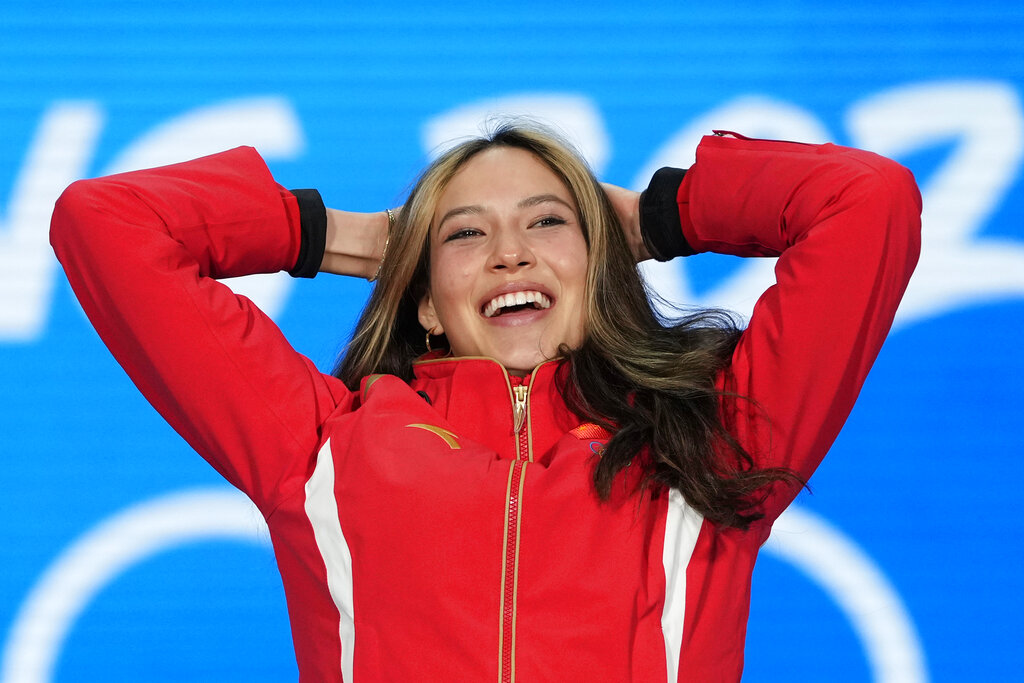It turns out Olympic gold medalist Eileen Gu and I have something in common. We were both athletes at University High School in San Francisco. She is one of the best skiers in the world and I was the backup first baseman on the varsity baseball team, so the similarity only goes so far.
I don’t follow sports other than baseball, so I learned of Gu only a few days ago when I saw a picture of her on our shared alma mater’s Instagram page bidding her “good luck as she represents China in her first Olympic Games.”
Very shortly after that, I began seeing articles about the controversy surrounding Gu’s popularity and stature — that she is representing China in the 2022 Beijing Winter Olympics but was born and raised in the United States.
- Given the nature of the China-US relationship at the moment, Gu’s decision was bound to generate some version of this response. Some in the United States have further criticized her for refusing to discuss politics or tspeak out against China’s human rights abuses.
The irony of that criticism should not be lost on even the casual sports fan — because whenever athletes in the United States speak up about racism or other American problems, they are told by a large segment of the sports world some variation of “stick to sports” or, if they are basketball players, “shut up and dribble.” Eileen Gu is also not the first American to compete for another country.

It is not uncommon for American athletes to represent countries to which they have a family connection or ancestral tie in international athletic competitions, including in the Olympics, the World Cup and even the World Baseball Classic. Many American-born athletes who compete for other nations do so because it gives them a greater opportunity to make it to competitions like the Olympics. And almost none of them draws attention in the United States the way Gu has.
In Olympic competition, examples abound, going back decades, of athletes from all over the world competing for other countries — some after defecting to the United States from behind the Iron Curtain before its fall, others because their nations have been broken by war, some because they’ve married and emigrated elsewhere and still others because they’re looking for an easier path, competition-wise, to their Olympic berth.
Why this California judge should be Biden’s Supreme Court pick Compare Eileen Gu’s experience to that of Team Israel from the 2017 World Baseball Classic. The team was very good and managed to defeat the Netherlands, South Korea, Taiwan and even Cuba, but they did that with a roster made up almost entirely of Americans, most of whom were not quite good enough to make the US team. Gu is different, athletically and otherwise.
First of all, she is obviously good enough to ski for the American team, but she chose China. Nobody besides Gu can know for certain why she did this, but it is clear from her public comments that Gu identities strongly with both countries and both cultures. “I definitely feel as though I’m just as American as I am Chinese. I am American when I am in the US,
I am Chinese when I am in China. I’ve been outspoken about my gratitude to both the US and China for making me the person I am,” she said Tuesday at a news conference after she won gold in the freestyle skiing big air competition. (It’s worth noting that she said this in response to a reporter’s question about whether she’s still a US citizen, a question she did not address directly.)Given that she was brought up in the United States by a mother who raised Gu as a single parent after emigrating from China, that is not altogether surprising.
More striking than Gu’s decision to ski for China is the scrutiny it has gotten here in the United States. Taking into account the intensity of competition between the two powers and acknowledging the legitimacy of the criticism of China for human rights abuses, that level of focus still reveals more about many of the scrutinizers than Gu herself.
In this regard, Gu has become something of a geopolitical Olympic Rorschach test. For some, Gu is just a young woman caught between two countries making a difficult decision. For others, it is hard not to see the financial side of this. Gu’s success has already added to her considerable popularity in China. For example, in the hours after winning her first gold medal, Gu and her accomplishment were by far the most talked about topics on Chinese social media.
Critics on social media and commentary pages have framed the decision to ski for China as Gu turning her back on the country that raised her and casting her lot with an authoritarian regime. Media outlets have portrayed her as a bratty Gen Zer who is oblivious to the world around her. She may be a little bit of all these things, but she is also not entirely any of them. And many of these opinions seem to be grounded in America’s frustration with an ascendant China relative to the United States — something for which Gu cannot blamed.
Just as it is not possible to understand the contretemps around Gu outside of the current geopolitical climate, it is similarly impossible to disaggregate it from the current racial climate in the United States. Increased violence against Asian Americans in the past year or two is related to efforts to blame Covid-19 on China and increased tensions between the United States and China. Criticism of Gu occurs in this context as well (though of course, Gu made her decision to compete for China three years ago, so while the criticism of her lives in that context, none of it likely influenced her choices). Central to much of this is the notion that Gu is somehow ungrateful for what the United States has given her.
Eileen Gu is only the latest athlete whose Olympic performance has been highly politicized, but for a Chinese American athlete with dual citizenship (kind of), that was unavoidable. Maybe instead of getting angry at an 18-year-old, albeit one who graduated from a very fine high school, more people should look inward at what is motivating that anger.
While so much of the discourse around Gu here in the United States focuses on the politics, her citizenship and what she should or should not be discussing, in China, a teenager is being appreciated for her extraordinary athletic accomplishment and is rapidly becoming one of the biggest sports stars in the country. For the moment, that is the real story.






